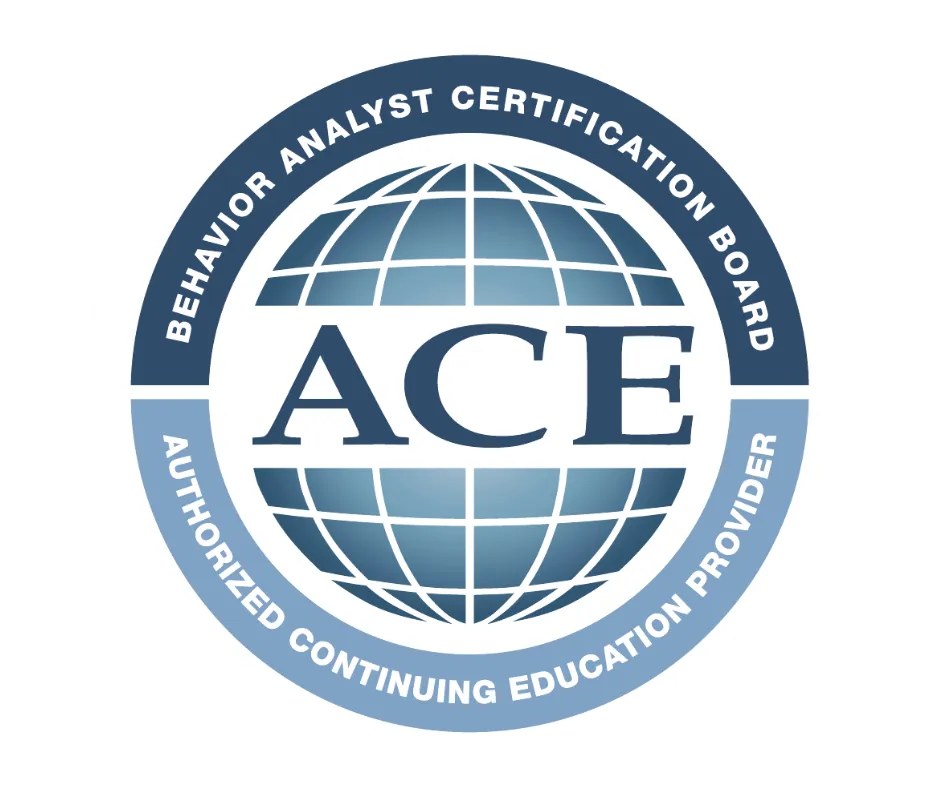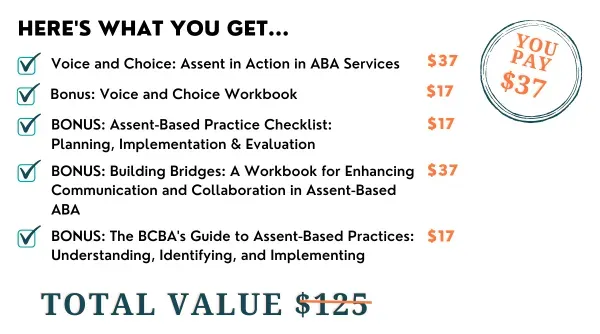2 General Type CEUs
Voice and Choice: Assent in Action in ABA Services
Tired of Battling with Parents? Discover the Secret to Building Powerful Collaborations


Instructor: Amelia Dalphonse, MA, BCBA

Amelia Dalphonse, MA, BCBA
Why is Voice and Choice essential to your career as a BCBA®?
Are you an ABA practitioner who:
Feels conflicted about using traditional ABA methods?
Wants to provide ethical, compassionate, and learner-centered care?
Is looking for a better way to address challenging behaviors?
Transform your practice with our new CEU course!

What you will learn:

Understand Assent
Understand the concept of assent and its ethical implications

Assess and Interpret
Assess learner preferences and interpret communication from both verbal and non-verbal learners

Implement Assent
Implement assent-based practices and foster collaboration with families and stakeholders

Monitor and Adapt
Monitor and adapt interventions based on learner assent

Bridge the Gap
Bridge the gap between evidence-based practice and compassionate care

Individualize
Learn to individualize your approach to obtaining and honoring assent based on each learner's unique needs and communication style.
What’s Included with Voice and Choice?
This course will not only equip you with the knowledge and skills to implement assent-based practices but also revolutionize the way you approach ABA therapy:

1. Understand the Ethical Imperative of Assent:
Go beyond compliance: Move from simply following ethical guidelines to truly understanding the moral and ethical reasons why respecting learner autonomy is essential.
Shift your perspective: View learners as active participants, not passive recipients of therapy.
Advocate for change: Become a champion for ethical, person-centered ABA within your organization and the wider community.
2. Master the Art of Communication:
Decode nonverbal cues: Learn to read subtle signals of assent, dissent, and emotional states, even in learners with limited verbal communication.
Build rapport and trust: Foster deeper connections with learners by understanding and responding to their unique communication styles.
Tailor interventions: Create truly individualized plans that resonate with each learner’s preferences and needs.
3. Empower Learners and Families:
Foster collaboration: Build strong partnerships with learners and families, valuing their input and expertise.
Promote self-advocacy: Equip learners with the skills to express their needs and make choices about their own lives.
Create a positive therapeutic experience: Shift the focus from compliance to collaboration, making therapy a more enjoyable and empowering experience for everyone involved.
4. Adapt Interventions Dynamically:
Monitor for ongoing assent: Continually assess learner responses to ensure interventions remain aligned with their preferences.
Be flexible and responsive: Adjust your approach based on learner feedback, ensuring that interventions remain relevant and effective over time.
Maximize learner engagement: By adapting to learner needs, you’ll increase their motivation and participation in therapy.
5. Unite Science and Compassion:
Integrate evidence-based practices: Maintain high standards of clinical excellence while prioritizing learner well-being and autonomy.
Challenge traditional approaches: Question and refine existing practices to align with the principles of assent and person-centered care.
Lead the way: Become a pioneer in a new era of ABA, where evidence-based practice and compassionate care seamlessly coexist.
This course is not just about learning new skills; it’s about transforming your practice from the inside out. By embracing assent-based principles, you will not only become a more ethical and effective practitioner but also a catalyst for positive change in the field of ABA.
The Hidden Dangers of Ignoring Assent in ABA Practice

While ABA has the potential to empower individuals with autism,neglecting assent can lead to serious ethical and practical consequences that hinder progress and well-being:
Increased Challenging Behaviors: Forcing learners to participate in activities they do not want to engage in can lead to increased frustration, anxiety, and challenging behaviors. This can create a negative cycle where the learner associates therapy with coercion and distress.
Decreased Motivation and Engagement: When learners feel their preferences are not being considered, their motivation to participate in therapy can dwindle. This can hinder skill acquisition and progress towards goals.
Long-Term Negative Impacts: The negative experiences associated with non-assent-based practices can have lasting effects on the learner’s mental health, self-esteem, and overall well-being. It can also lead to a negative perception of ABA, further stigmatizing the field.

But the problem’s even worse than that! Failure to acknowledge assent/dissent in your practice can lead to:
Ethical Violations: Ignoring a learner’s right to make choices about their own body and experiences can be a violation of their autonomy and dignity. It contradicts the core principles of ethical ABA practice outlined in the BACB’s Ethics Code.
Damaged Therapeutic Relationship: Ignoring assent can erode trust and damage the relationship between the BCBA® and the learner, making it difficult to establish a collaborative and supportive learning environment.
Empower Your Practice with Assent-Based Strategies
By prioritizing assent, you can avoid these dangers and create a more positive and effective therapeutic experience for your learners. Our course, Voice and Choice: Assent in Action in ABA Services will equip you with the knowledge and skills to:
Understand the ethical and practical importance of assent.
Identify and interpret various forms of assent, including verbal and nonverbal communication.
Develop effective strategies for obtaining and respecting assent.
Create learner-centered interventions that prioritize choice and autonomy.
Build collaborative relationships with learners and their families.
Don’t let the absence of assent undermine your practice and harm your learners. Invest in your professional development and embrace the power of assent-based ABA. Enroll in our course today and transform your practice into one that truly empowers and respects the voices of those you serve.
Trusted ACE Instructors Approved through the BACB
Quality Assurance You Can Trust: All of our instructors are certified Authorized Continuing Education (ACE) providers through the Behavior Analyst Certification Board (BACB). This ensures that our CEU courses meet the rigorous standards set by the BACB and qualify for CEU credits towards maintaining your BCBAs’® certifications.

See what people are saying about Voice and Choice
It is a good fit for all practitioners.

Ofelia S.
Great real life examples.

Julie L.
Act now, and you can get Voice and Choice – plus get these exclusive bonuses!


Meet the Instructor

Amelia Dalphonse, MA, BCBA
Amelia Dalphonse, MA, BCBA, co-founded Master ABA with her twin sister, Dianna Kelly, bringing over 13 years of expertise in Applied Behavior Analysis (ABA). Passionate about prioritizing client needs, Amelia earned a Master’s degree in ABA and became a Board Certified Behavior Analyst (BCBA).
At Master ABA, Amelia and Dianna lead with innovation, emphasizing client-centered care to drive meaningful change. As an ACE provider, they’ve established the institution as a hub for progressive ABA practices, inspiring others to adopt compassionate and ethical approaches.
Through her role at Master ABA, Amelia advocates for advancing the ABA field with empathy and integrity. She stays abreast of the latest research, continuously seeking opportunities for professional growth.
